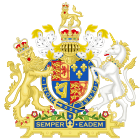Occasional Conformity Act 1711 facts for kids

|
|
| Long title | An Act for preserving the Protestant Religion by better securing the Church of England as by Law established and for confirming the Toleration granted to Protestant Dissenters by an Act intituled An Act for exempting Their Majesties Protestant Subjects dissenting from the Church of England from the Penalties of certain Laws and for supplying the Defects thereof and for the further securing the Protestant Succession by requiring the Practicers of the Law in North Britain to take the Oaths and subscribe the Declaration therein mentioned |
|---|---|
| Citation | 10 Ann. c. 6 (Ruffhead c. 2) |
| Dates | |
| Royal assent | 22 December 1711 |
| Repealed | 1719 |
The Occasional Conformity Act was an important law passed in Great Britain in 1711. It was also known as the Occasional Conformity Act 1711 or the Toleration Act 1711. This law aimed to stop certain people from holding public jobs unless they fully followed the official Church of England.
What Was Occasional Conformity?
Before this Act, there were laws like the Corporation Act 1661 and the Test Act. These laws said that only members of the Church of England could work in government jobs. However, some Nonconformists found a way around this. Nonconformists were Protestants who did not belong to the Church of England, like Baptists or Congregationalists.
To get a public job, these Nonconformists would sometimes attend a Church of England service. They would take part in the Eucharist, which is a special religious ceremony. After doing this once, they could then hold a public office. This practice was called "occasional conformity." It meant they were only "conforming" (following the rules) occasionally.
Why Was This Law Made?
The Occasional Conformity Act was passed by a political group called the Tories. They wanted to weaken their rivals, the Whigs. Many Nonconformists supported the Whig party. By making it harder for Nonconformists to hold office, the Tories hoped to gain more control over Parliament.
The Act said that if a government official in England or Wales was supposed to attend Church of England services, they had to do so. If they went to any other religious meeting, they would be fined £40. They would also be permanently banned from government jobs. This law did not apply to Scotland, because its official church, the Presbyterian kirk, was protected by the Acts of Union 1707.
Interestingly, Prince George of Denmark, the Queen's husband, was a practicing Lutheran. He was an "occasional conformist" himself. Even so, he had voted for an earlier version of this bill, at his wife's request. He died in 1708, before the Act was finally passed.
What Happened Next?
The Occasional Conformity Act did not have a big impact. Many Nonconformist officials were protected by powerful people. Others attended private religious services, which the law did not cover.
The idea of "hypocrisy" became a big topic in politics around this time. People debated whether it was right to pretend to follow one religion to gain a job. The Toleration Act 1689 had given some rights to Nonconformists. But it still stopped them from holding public office. The Occasional Conformity Act was a strong reaction against those who tried to get around these rules.
This debate led to many arguments in sermons, speeches, and pamphlets. People on both sides accused each other of being insincere. The arguments were very fierce, especially during the trial of a preacher named Henry Sacheverell in 1709.
The Occasional Conformity Act was eventually cancelled in 1719. This happened when the Whig party returned to power.
 | James Van Der Zee |
 | Alma Thomas |
 | Ellis Wilson |
 | Margaret Taylor-Burroughs |

